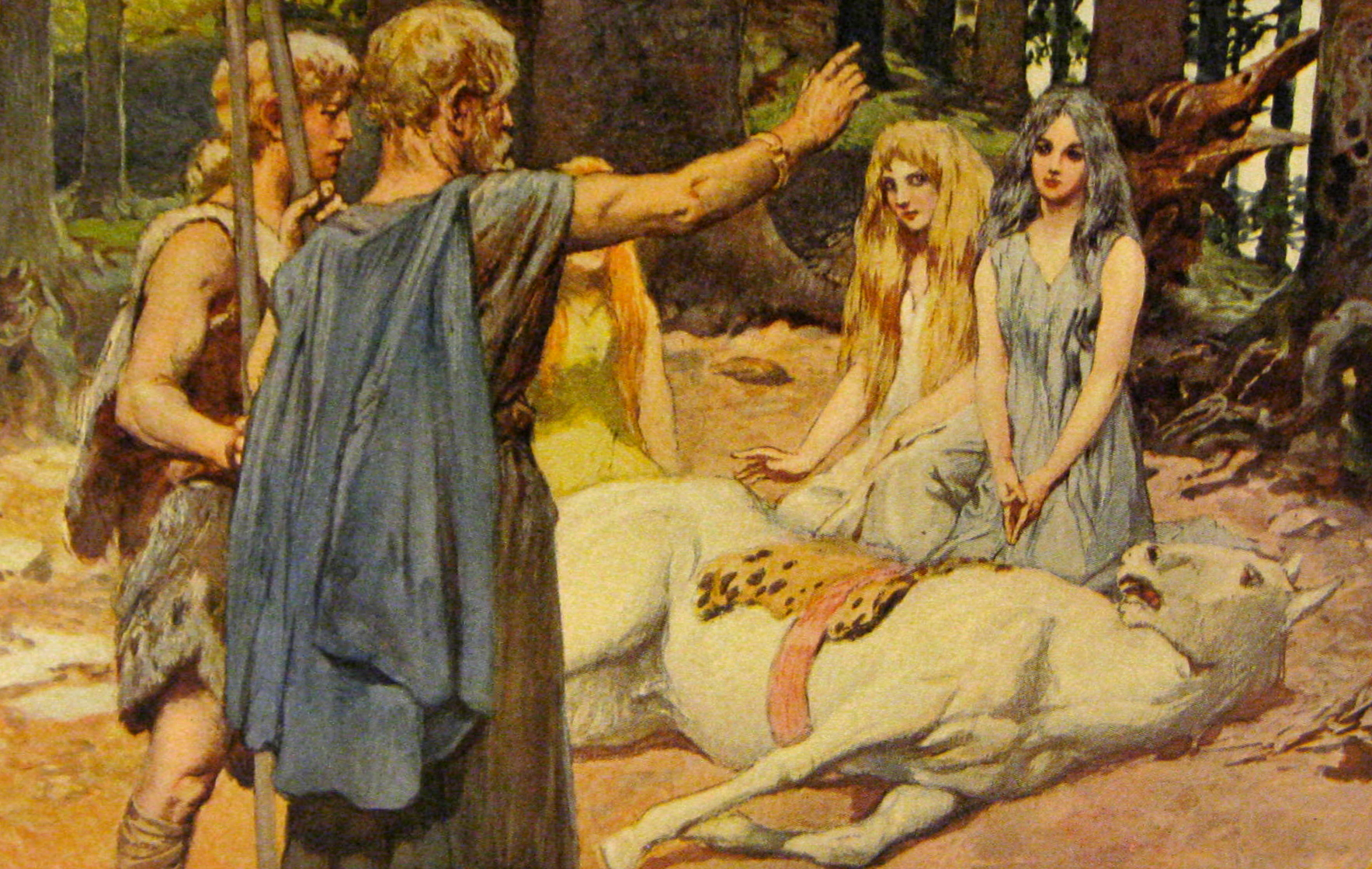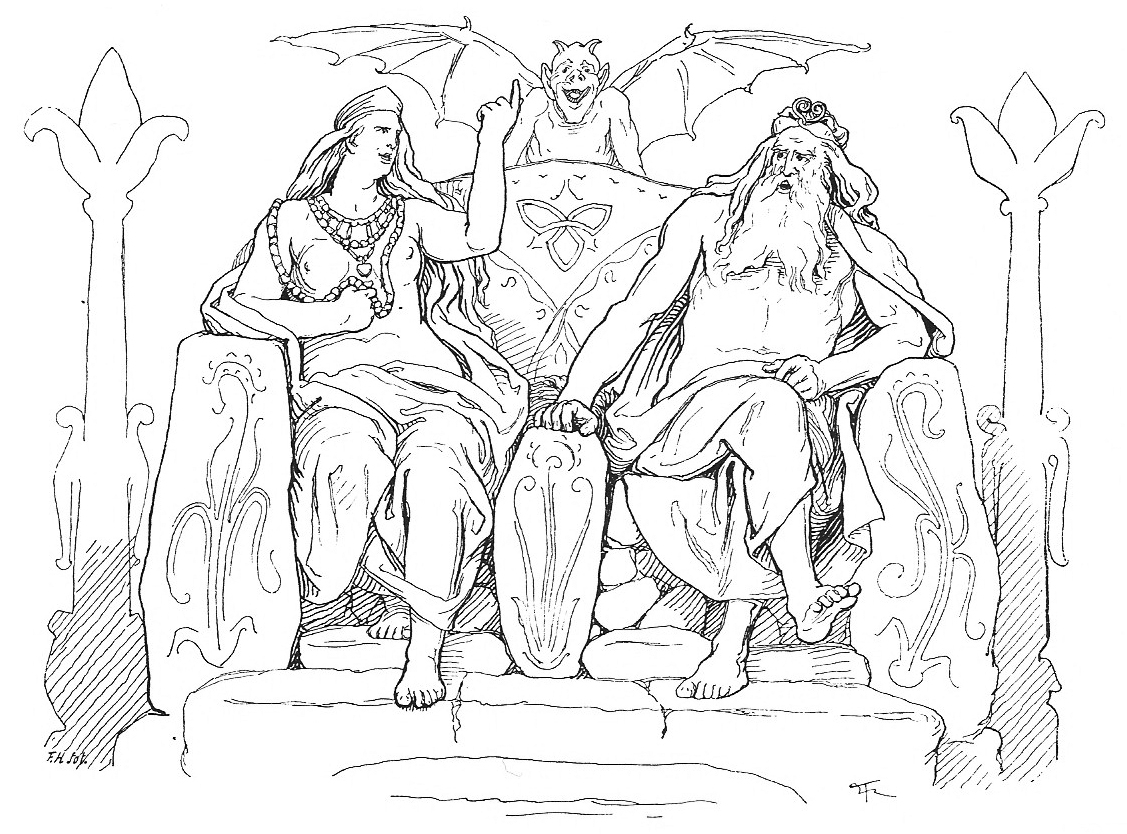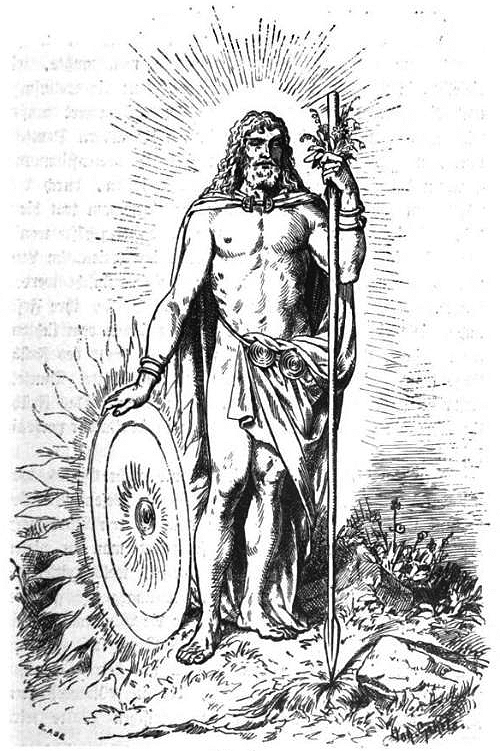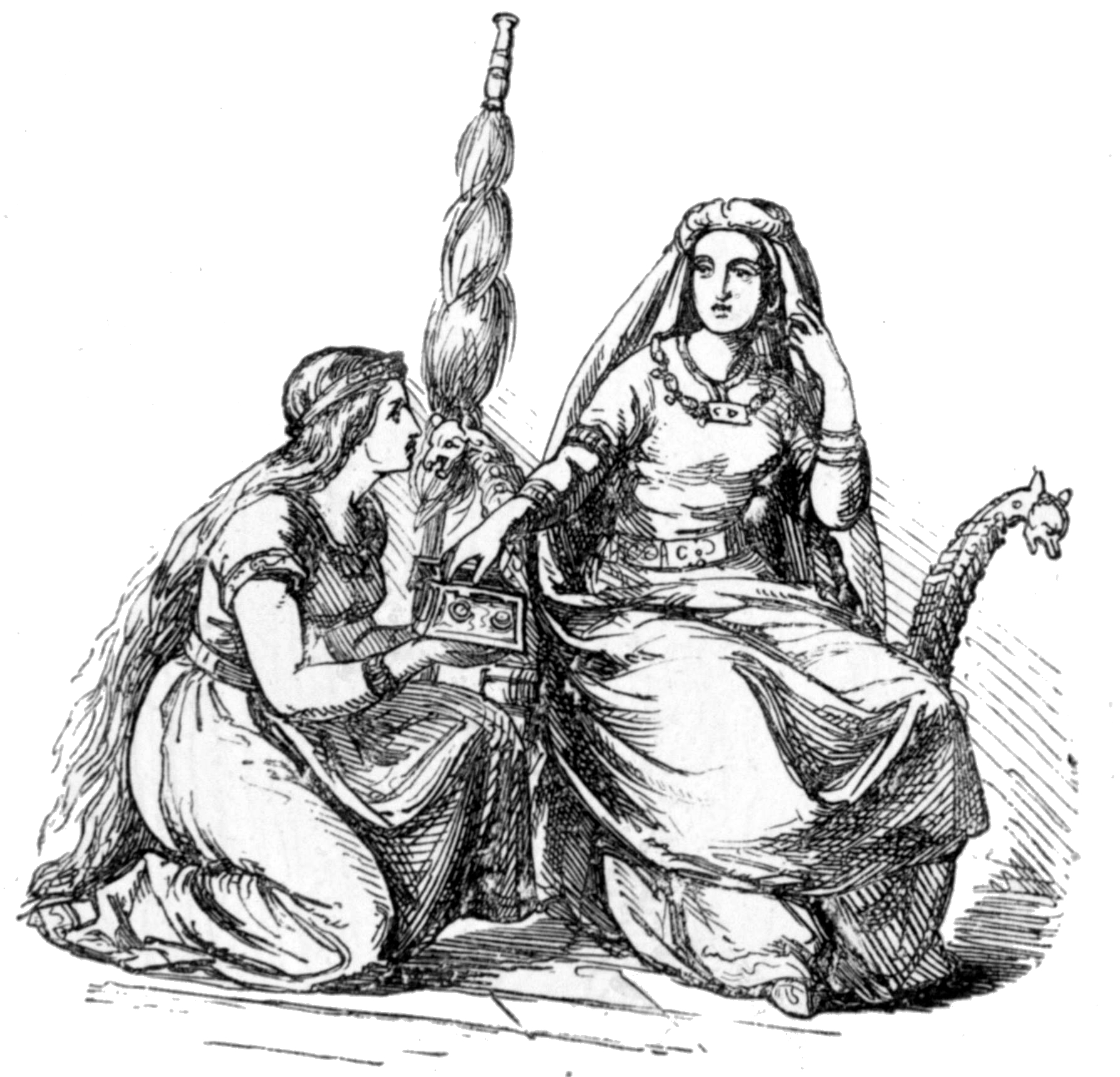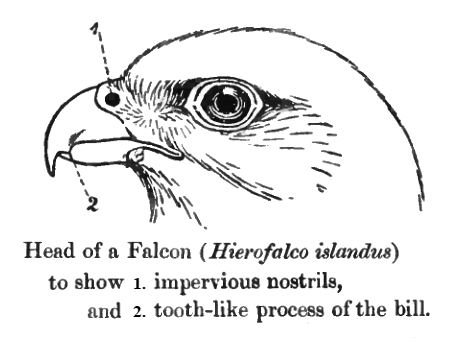|
Fensalir
In Norse mythology, Fensalir (Old Norse "Fen Halls"Orchard (1997:43).) is a location where the goddess Frigg dwells. Fensalir is attested in the ''Poetic Edda'', compiled in the 13th century from earlier traditional sources, and the ''Prose Edda'', written in the 13th century by Snorri Sturluson. Scholars have proposed theories about the implications of the location, including that the location may have some connection to religious practices involving springs, bogs, or swamps in Norse paganism, and that it may be connected to the goddess Sága's watery location Sökkvabekkr. Attestations In the ''Poetic Edda'' poem ''Völuspá'', Frigg is described as weeping over her son Baldr's death in Fensalir. This stanza is absent in the ''Hauksbók'' manuscript of the poem.Lindow (2001:114). The portion of the stanza mentioning Fensalir foretells that vengeance will come for the death of Baldr and that: :while Frigg wept :in Fen Halls :for Valhǫll's woe.Dronke (1997:16). In chapter 3 ... [...More Info...] [...Related Items...] OR: [Wikipedia] [Google] [Baidu] |
Sága And Sökkvabekkr
In Norse mythology, Sága (, possibly meaning "seeress"Orchard (1997:136).) is a goddess associated with the location Sökkvabekkr (Old Norse: ; "sunken bank", "sunken bench", or "treasure bank"Orchard (1997:152) and Lindow (2001:265) have "sunken bank". Byock (2005:175) has "sunken bank or bench". Simek (2007:297) has "sunken bank" or "treasure bank."). At Sökkvabekkr, Sága and the god Odin merrily drink as cool waves flow. Both Sága and Sökkvabekkr are attested in the ''Poetic Edda'', compiled in the 13th century from earlier traditional sources, and in the ''Prose Edda'', written in the 13th century by Snorri Sturluson. Scholars have proposed theories about the implications of the goddess and her associated location, including that the location may be connected to the goddess Frigg's fen residence Fensalir and that Sága may be another name for ''Frigg''. Etymology The etymology of the name ''Sága'' is generally held to be connected to the Old Norse verb ''sjá'', meani ... [...More Info...] [...Related Items...] OR: [Wikipedia] [Google] [Baidu] |
Frigg By Doepler
Frigg (; Old Norse: ) is a goddess, one of the Æsir, in Germanic mythology. In Norse mythology, the source of most surviving information about her, she is associated with marriage, prophecy, clairvoyance and motherhood, and dwells in the wetland halls of Fensalir. In wider Germanic mythology, she is known in Old High German as , in Langobardic as , in Old English as , in Old Frisian as ''Frīa'', and in Old Saxon as , all ultimately stemming from the Proto-Germanic theonym *''Frijjō''. Nearly all sources portray her as the wife of the god Odin. In Old High German and Old Norse sources, she is specifically connected with Fulla, but she is also associated with the goddesses Lofn, Hlín, Gná, and ambiguously with the Earth, otherwise personified as an apparently separate entity Jörð (Old Norse: 'Earth'). The children of Frigg and Odin include the gleaming god Baldr. The English weekday name Friday (ultimately meaning 'Frigg's Day') bears her name. After Christianization, t ... [...More Info...] [...Related Items...] OR: [Wikipedia] [Google] [Baidu] |
Frigg
Frigg (; Old Norse: ) is a goddess, one of the Æsir, in Germanic mythology. In Norse mythology, the source of most surviving information about her, she is associated with marriage, prophecy, clairvoyance and motherhood, and dwells in the wetland halls of Fensalir. In wider Germanic mythology, she is known in Old High German as , in Langobardic as , in Old English as , in Old Frisian as ''Frīa'', and in Old Saxon as , all ultimately stemming from the Proto-Germanic theonym *''Frijjō''. Nearly all sources portray her as the wife of the god Odin. In Old High German and Old Norse sources, she is specifically connected with Fulla, but she is also associated with the goddesses Lofn, Hlín, Gná, and ambiguously with the Earth, otherwise personified as an apparently separate entity Jörð (Old Norse: 'Earth'). The children of Frigg and Odin include the gleaming god Baldr. The English weekday name Friday (ultimately meaning 'Frigg's Day') bears her name. After Christianization, t ... [...More Info...] [...Related Items...] OR: [Wikipedia] [Google] [Baidu] |
Baldr
Baldr (also Balder, Baldur) is a god in Germanic mythology. In Norse mythology, Baldr (Old Norse: ) is a son of the god Odin and the goddess Frigg, and has numerous brothers, such as Thor and Váli. In wider Germanic mythology, the god was known in Old English as , and in Old High German as , all ultimately stemming from the Proto-Germanic theonym ('hero' or 'prince'). During the 12th century, Danish accounts by Saxo Grammaticus and other Danish Latin chroniclers recorded a euhemerized account of his story. Compiled in Iceland during the 13th century, but based on older Old Norse poetry, the ''Poetic Edda'' and the ''Prose Edda'' contain numerous references to the death of Baldr as both a great tragedy to the Æsir and a harbinger of Ragnarök. According to ''Gylfaginning'', a book of Snorri Sturluson's Prose Edda, Baldr's wife is Nanna and their son is Forseti. Baldr had the greatest ship ever built, Hringhorni, and there is no place more beautiful than his hall, Breidablik ... [...More Info...] [...Related Items...] OR: [Wikipedia] [Google] [Baidu] |
Loki
Loki is a god in Norse mythology. According to some sources, Loki is the son of Fárbauti (a jötunn) and Laufey (mentioned as a goddess), and the brother of Helblindi and Býleistr. Loki is married to Sigyn and they have two sons, Narfi or Nari and Váli. By the jötunn Angrboða, Loki is the father of Hel, the wolf Fenrir, and the world serpent Jörmungandr. In the form of a mare, Loki was impregnated by the stallion Svaðilfari and gave birth to the eight-legged horse Sleipnir. Loki's relation with the gods varies by source; he sometimes assists the gods and sometimes behaves maliciously towards them. Loki is a shape shifter and in separate incidents appears in the form of a salmon, a mare, a fly, and possibly an elderly woman named Þökk (Old Norse 'thanks'). Loki's positive relations with the gods end with his role in engineering the death of the god Baldr, and eventually, Odin's specially engendered son Váli binds Loki with the entrails of one of his sons; in the ''Pr ... [...More Info...] [...Related Items...] OR: [Wikipedia] [Google] [Baidu] |
Mistletoe
Mistletoe is the common name for obligate hemiparasitic plants in the order Santalales. They are attached to their host tree or shrub by a structure called the haustorium, through which they extract water and nutrients from the host plant. The name mistletoe originally referred to the species ''Viscum album'' (European mistletoe, of the family Santalaceae in the order Santalales); it is the only species native to the British Isles and much of Europe. A related species with red rather than white fruits, ''Viscum cruciatum'', occurs in Southwest Spain and Southern Portugal, as well as in Morocco in North Africa and in southern Africa. The genus ''Viscum'' is not native to North America, but ''Viscum album'' was introduced to Northern California in 1900. The eastern mistletoe native to North America, ''Phoradendron leucarpum'', belongs to a distinct genus of the family Santalaceae. European mistletoe has smooth-edged, oval, evergreen leaves borne in pairs along the woody st ... [...More Info...] [...Related Items...] OR: [Wikipedia] [Google] [Baidu] |
Skáldskaparmál
''Skáldskaparmál'' (Old Norse: 'The Language of Poetry'; c. 50,000 words; ; ) is the second part of the ''Prose Edda''. The section consists of a dialogue between Ægir, the divine personification of the sea, and Bragi, the god of poetry, in which both Norse mythology and discourse on the nature of poetry are intertwined. The origin of a number of ''kennings'' is given; then Bragi delivers a systematic list of ''kennings'' for various people, places and things. He then goes on to discuss poetic language in some detail, in particular ''heiti'', the concept of poetical words which are non-periphrastic (like ''steed'' for ''horse''), and again systematises these. This in a way forms an early form of poetic thesaurus. References Bibliography * Further reading * Anthony Faulkes"The sources of ''Skáldskaparmál'': Snorri’s intellectual background" in: Alois Wolf (ed.), ''Snorri Sturluson'', Volume 51 of ScriptOralia, Gunter Narr Verlag (1993), 59–76. External ... [...More Info...] [...Related Items...] OR: [Wikipedia] [Google] [Baidu] |
Fulla
Fulla (Old Norse: , possibly 'bountiful') or Volla (Old High German, 'plenitude') is a goddess in Germanic mythology. In Norse mythology, Fulla is described as wearing a golden band and as tending to the ashen box and the footwear owned by the goddess Frigg, and, in addition, Frigg confides in Fulla her secrets. Fulla is attested in the ''Poetic Edda'', compiled in the 13th century from earlier traditional sources; the ''Prose Edda'', written in the 13th century by Snorri Sturluson; and in skaldic poetry. Volla (''Folla'') is attested in the "Horse Cure" Merseburg Incantation, recorded anonymously in the 10th century in Old High German, in which she assists in healing the wounded foal of Phol and is referred to as Frigg's sister. Scholars have proposed theories about the implications of the goddess. Name The Old Norse name ''Fulla'' has been translated as 'bountiful'. It stems from Proto-Germanic ''*fullōn'' ('fullness, plenitude'; cf. Gothic ''fullo'' 'fullness', OHG ''foll ... [...More Info...] [...Related Items...] OR: [Wikipedia] [Google] [Baidu] |
John Lindow
John Frederick Lindow (born July 23, 1946) is an American philologist who is Professor Emeritus of Old Norse and Folklore at University of California, Berkeley. He is a well known authority on Old Norse religion and literature. Biography John Lindow was born in Washington, D.C. on July 23, 1946, the son of Wesley Lindow and Eleanor Niemetta. His father was a banker and his mother was a teacher. John Lindow received his undergraduate degree at Harvard University, where he gained a A.B. magna cum laude in 1968, and a PhD in 1972, both in Germanic Languages and Literatures. After gaining his Ph.D, Lindow joined the faculty at University of California, Berkeley, serving as Acting Assistant Professor (1972-1974), Assistant Professor (1974-1977), Associate Professor (1977-1983), and Professor of Scandinavian (1983-?). He was since retired as Professor Emeritus of Old Norse and Folklore. In 1977, Lindow was elected as a corresponding member of the Royal Gustavus Adolphus Academy. In ... [...More Info...] [...Related Items...] OR: [Wikipedia] [Google] [Baidu] |
Falcon
Falcons () are birds of prey in the genus ''Falco'', which includes about 40 species. Falcons are widely distributed on all continents of the world except Antarctica, though closely related raptors did occur there in the Eocene. Adult falcons have thin, tapered wings, which enable them to fly at high speed and change direction rapidly. Fledgling falcons, in their first year of flying, have longer flight feathers, which make their configuration more like that of a general-purpose bird such as a broad wing. This makes flying easier while learning the exceptional skills required to be effective hunters as adults. The falcons are the largest genus in the Falconinae subfamily of Falconidae, which itself also includes another subfamily comprising caracaras and a few other species. All these birds kill with their beaks, using a tomial "tooth" on the side of their beaks—unlike the hawks, eagles, and other birds of prey in the Accipitridae, which use their feet. The largest fal ... [...More Info...] [...Related Items...] OR: [Wikipedia] [Google] [Baidu] |
Gylfi
In Norse mythology, Gylfi (Old Norse: ), ''Gylfe'', ''Gylvi'', or ''Gylve'' was the earliest recorded king in Scandinavia. He often uses the name Gangleri when appearing in disguise. The traditions on Gylfi deal with how he was tricked by the gods and his relations with the goddess Gefjon. The creation of Zealand The ''Ynglinga saga'' section of Snorri's ''Heimskringla'' and the Eddic poem ''Ragnarsdrápa'' tell a legend of how Gylfi was seduced by the goddess Gefjon to give her as much land as she could plow in one night. Gefjon transformed her four sons into oxen and took enough land to create the Danish island of Zealand, leaving the Swedish lake Vänern. Meeting the Æsir ''Gylfaginning'' in the ''Prose Edda'' and the ''Ynglinga saga'' tell how the supposedly historic (non-deified version) Odin and his people the Æsir and Vanir, who later became the Swedes, obtained new land where they built the settlement of Old Sigtuna. In Snorri's account Gylfi is supposedly deluded by ... [...More Info...] [...Related Items...] OR: [Wikipedia] [Google] [Baidu] |
Rudolf Simek
Rudolf Simek (born 21 February 1954) is an Austrian philologist and religious studies scholar who is Professor and Chair of Ancient German studies, German and Scandinavian studies, Nordic Studies at the University of Bonn. Simek specializes in Germanic studies, and is the author of several notable works on Germanic paganism, Germanic religion and Germanic mythology, mythology (including Old Norse religion and Norse mythology, mythology), Germanic peoples, Vikings, Old Norse literature, and the culture of Medieval Europe. Biography Since 1995, Simek has been Professor and Chair of Ancient German and Nordic Studies at the University of Bonn. Simek was appointed Professor of Comparative Religion at the University of Tromsø in 1999, and Professor of Old Nordic Studies at the University of Sydney in 2000. Simek has held a number of visiting professorships, having had long research stays at the universities of Reykjavík University, Reykjavik, University of Copenhagen, Copenhagen, Lo ... [...More Info...] [...Related Items...] OR: [Wikipedia] [Google] [Baidu] |


